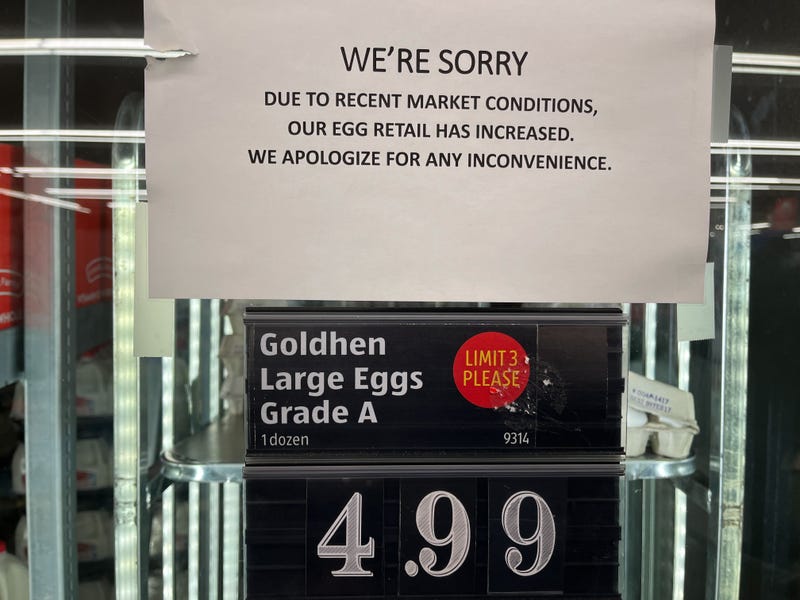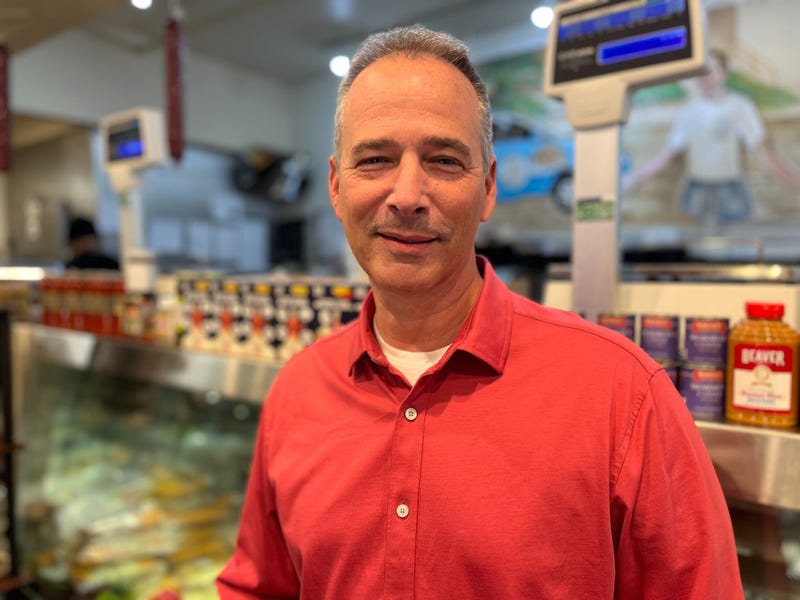
MERION STATION, Pa. (KYW Newsradio, AP) — Hens can’t fly very far, but the cost of their eggs, a staple of American pantries, sure can soar. A carton of eggs costs about $5 in Philadelphia — and that’s at a discount grocery store.
“This is Aldi,” said Victor Manning of Overbrook, incredulous. “If you go to a place like, say, Whole Foods, you're probably going to pay $7, $8 for eggs — and that's way too high. I just won’t eat eggs. I'll stop it.”
A lingering bird flu outbreak, combined with the soaring costs of feed, fuel and labor, has led to U.S. egg prices more than doubling over the past year — and it has hatched a lot of sticker shock in grocery aisles.
The national average price for a dozen eggs hit $3.59 in November, up from $1.72 a year earlier, according to the latest government data. Then egg prices soared 25% just from November to December.
The volatility is putting stress on consumer budgets and the bottom lines of restaurants, bakeries and other food producers that rely heavily on eggs.

Restaurant owner Josh Small says he has had to change his menu at Savvati.
“Commercially, a case of eggs that used to cost on sale $17 now is $80 — eight zero — and up,” he said. “Once I realize I'm paying a lot more for eggs, … I’m forced to raise the prices on certain items.”
At Hymie’s delicatessen, owner Louis Barson says a lot of his menu items are affected by the cost of eggs.
“Our matzah ball soup,” he said. “[Egg] goes into our potato latkes. It goes for, obviously, all our eggs, our omelets. It goes into our pancake batter, which we use a ton of.”
Barson says he isn’t raising prices just yet, but he may have to make a tough call on when to hit customers who are already feeling the pinch of overall inflation.
“It isn't something that you can just say, ‘Okay, today I'm going to change the menu price and tomorrow I'm going to drop it again,’” he said. So for now, he says, he will eat much of the cost.

Barson says his suppliers have told him egg prices should come down soon. But even when they do come back to earth, he says he doesn’t expect to see pre-pandemic prices again — “because all those manufacturers, their cost of doing business is up as well.”
Looking for the sunny side
Grocery prices that were up 12% in November are driving inflation higher, even though the overall pace of price increases slowed a bit through the fall as gas prices eased.
But egg prices are up significantly more than other foods — even more than chicken or turkey — because egg farmers were hit harder by the bird flu. More than 43 million of the 58 million birds slaughtered over the past year to control the virus have been egg-laying chickens, including some farms with more than a million birds apiece in major egg-producing states like Iowa.
But even with the cost increases, eggs remain relatively cheap compared to the price of other proteins like chicken or beef, with a pound of chicken breasts going for $4.42 on average in November and a pound of ground beef selling for $4.85, according to the Bureau of Labor Statistics.
In some places, it can even be hard to find eggs on the shelves. But egg supplies overall are holding up because the total flock is only down about 5% from its normal size of around 320 million hens. Farmers have been working to replace their flocks as soon as they can after an outbreak.
Purdue University agricultural economist Jayson Lusk said he believes the bird flu outbreak is the biggest driver in the price increases. Unlike past years, the virus lingered throughout the summer and made a resurgence last fall infecting egg and poultry farms.
“Bird flu is not the only factor, but in my view it’s the main driver of what we’re experiencing at the moment,” Lusk said.
But the president and CEO of the American Egg Board trade group, Emily Metz, said she believes all the cost increases farmers have faced in the past year were a bigger factor in the price increases than bird flu.
“When you’re looking at fuel costs go up, and you’re looking at feed costs go up as much as 60%, labor costs, packaging costs — all of that ... those are much much bigger factors than bird flu for sure,” Metz said.
Jada Thomson, a University of Arkansas agricultural economist, said there may be some relief coming in egg prices in the next couple months because egg farmers have been steadily replacing their flocks lost to bird flu last year and demand will ease a bit now that people are done with their holiday baking.
But she said bird flu remains a wildcard that could still drive prices higher if there are more sizeable outbreaks at egg farms. Farmers are doing all they can to limit the spread, but the disease is easily spread by migrating wild birds and the virus can be picked up on clothing or vehicles.


